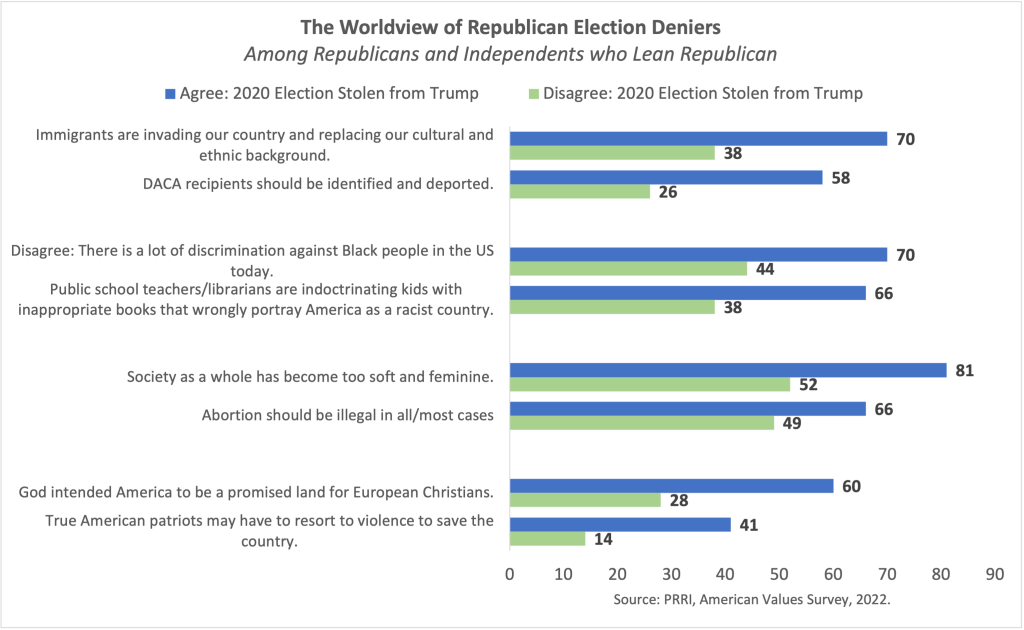Around elections, we often hear variations of the claim that “democracy itself is on the ballot.” Because this declaration is, in some sense, a truism, it’s easy to nod and dismiss its concrete claims. But in the current context, this declaration is not some vague slogan one might assert in any election in which the stakes are high and the divides are close.

Robert P. Jones (Photo by Noah Willman)
Our current situation is also not a “both sides” problem or simply the predictable result of decades of increasing negative partisanship. It is the direct result of one political party giving itself over to the whims and dictates of a narcissistic would-be despot.
And it has led to this startling result: In this election, more than half of Republican candidates running for office are openly saying — without presenting any credible evidence — that the 2020 election was stolen from their preferred presidential candidate, Donald Trump.
Here are four independent assessments of the landscape we are facing this year:
- “More than half of GOP candidates running in the midterm elections are categorized by CBS News as election deniers — those who have raised doubts about the validity or integrity of the 2020 election. A CBS News review of every federal and statewide race found that 308 GOP candidates of the 597 Republicans running fall under that category.” (CBS News, 11/03/2022).
- “Candidates who have challenged or refused to accept Joe Biden’s victory — 51% of the 569 analyzed by The Washington Post— are running in every region of the country and in nearly every state. Republican voters in two states nominated election deniers in all federal and statewide races.… Although some are running in heavily Democratic areas and are expected to lose, most of the election deniers nominated are likely to win: Of the nearly 300 on the ballot, 171 are running for safely Republican seats. Another 48 will appear on the ballot in tightly contested races.” (The Washington Post, 10/12/2022).
- “So far, we have been able to identify 345 candidates who will be on the ballot in November who have expressed election denial beliefs — false claims that the presidential election in 2020 was flawed. All of them are running as Republicans … more than half of the election deniers look like they will win their races.” (The Brookings Institution, 10/07/2022).
- “Sixty percent of Americans will have an election denier on the ballot this fall.” (FiveThirtyEight, 11/07/2022).
Among the general population, belief in The Big Lie that the 2020 presidential election was stolen from Donald Trump has now become a tenet of the worldview of nearly six in 10 Republicans.
PRRI’s recently released American Values Survey found that majorities of Republicans (58%) and white evangelical Protestants (54%) falsely claim that the election was stolen from Trump, compared with around one in four independents (24%) and only 4% of Democrats.
These sentiments are only slightly down from March 2021 — shortly after Trump left the White House without conceding and refusing to welcome Joe and Jill Biden — when 64% of Republicans and 61% of white evangelicals embraced the Big Lie.
“If successful, these Republican election deniers will be strategically positioned to wreak havoc in 2024.”
If successful, these Republican election deniers will be strategically positioned to wreak havoc in 2024. Election-denying secretaries of state might refuse to certify elections with Democratic victories; election-denying governors could submit “alternative electoral votes” that do not reflect the outcome of the state’s popular vote; and election-denying members of Congress could give those fraudulent electors legitimacy at the federal level.
The consequences of these Republican election-denying candidates getting elected are monumental for a functioning government and a fair democratic election process in 2024. But even this grim prospect doesn’t give the full picture of what these candidates, and the voters behind them, promise to usher into our civic life.
Republican election deniers are not just obsessed with spurious theories about voter fraud. Rather, belief in the Big Lie is strongly correlated with a range of attitudes that constitute a worldview that is not only a threat to democracy but also to broader principles of inclusions, pluralism and equality — particularly related to immigration status, race, gender and gender identity, and religious affiliation.
It is a worldview of fixed hierarchies, with white people of European descent over all others, Christianity above other religions, and a rigid gender binary that valorizes traditional male traits and places men over women. Those who disagree with this worldview are increasingly seen not just as political opponents but as existential enemies complicit in evil.
The chart below — which draws on data from PRRI’s recent 2022 American Values Survey — looks at the stark differences, across a range of issues, that belief in the Big Lie makes among Republicans and independents who lean Republican. On most of the issues below, there is an attitudinal gap of at least 25 percentage points between Republican leaners who believe the election was stolen from Trump and Republican leaners who accept that Biden won the 2020 election.

Republican election deniers are staunchly anti-immigrant. Compared to Republicans who accept that Biden won the 2020 election, Republican election deniers are nearly twice as likely (70% vs. 38%) to believe in the “great replacement theory” — that immigrants are invading our country and replacing our cultural and ethnic background — which has been making the rounds on Fox News and other conservative outlets. Republican election deniers are harshly anti-immigrant even on the issue of DACA, which provides temporary legal status for people brought illegally as children to the U.S. by their parents — a policy that had in the recent past evoked support from “compassionate conservatism” proponents. But nearly six in 10 Republican election deniers, compared to only about one quarter of Republican election accepters, say DACA recipients should be identified and deported.
Seven in 10 Republican election deniers also deny that Black people experience a lot of discrimination in the U.S. today. To the contrary, they are much more likely to believe white people (62%) and Christians (56%) experience a lot of discrimination. By contrast, far fewer than half of Republicans who accept the validity of the 2020 election believe any of these distortions of reality.
Republican election deniers also have come to see our public school teachers and librarians as the enemy. Two thirds of Republic election deniers, compared to only 38% of Republican election accepters, believe public school teachers and librarians are indoctrinating kids with inappropriate books and curricula that wrongly portray America as a racist country.
Republican election deniers also view strength and hardness as a masculine virtue and perceive that vision to be under attack in society today. Eight in 10 Republican election deniers agree that “society as a whole has become too soft and feminine,” and seven in 10 agree that “society seems to punish men just for acting like men.” Fewer than half of Republican election accepters agree with these social assessments.
“Republican election deniers also view strength and hardness as a masculine virtue and perceive that vision to be under attack in society today.”
PRRI’s latest survey shows that 62% of Americans now say abortion should be legal in all or most cases. Notably, two thirds of Republican election deniers, compared to less than half of Republican election accepters, believe abortion should be illegal in all or most cases. And while two thirds of Americans overall now support allowing gay and lesbian couples to marry, a majority (53%) of Republican election deniers take the opposite view. Republican election accepters agree with the rest of their fellow Americans on marriage equality (66%).
Republican election deniers are twice as likely as Republican election accepters (60% vs. 28%) to be white Christian nationalists, who believe God intended America to be a promised land where European Christians could set an example for the rest of the world.
Most alarmingly, particularly given their belief in a divine mandate for their cause, Republican election deniers are nearly three times as likely as Republican election accepters to believe that “true American patriots may have to resort to violence to save the country” (41% vs. 14%).
We are rightly concerned with what the current crop of Republican election denier candidates might do to the machinery of democracy once they are elected. But these emboldened candidates, and their supporters, are also signaling their willingness to erode something much harder to repair: the legal and cultural foundations that support an inclusive, pluralistic future for our country.
Robert P. Jones is CEO and founder of PRRI and the author of White Too Long: The Legacy of White Supremacy in American Christianity, which won a 2021 American Book Award.
This column originally appeared on Robert P. Jones’s substack #WhiteTooLong.


